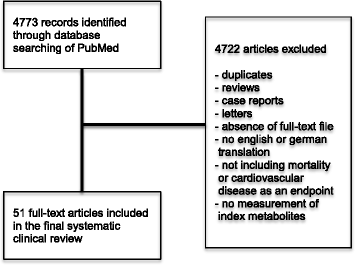Systematic review regarding metabolic profiling for improved pathophysiological understanding of disease and outcome prediction in respiratory infections
- PMID: 26471192
- PMCID: PMC4608151
- DOI: 10.1186/s12931-015-0283-6
Systematic review regarding metabolic profiling for improved pathophysiological understanding of disease and outcome prediction in respiratory infections
Abstract
Metabolic profiling through targeted quantification of a predefined subset of metabolites, performed by mass spectrometric analytical techniques, allows detailed investigation of biological pathways and thus may provide information about the interaction of different organic systems, ultimately improving understanding of disease risk and prognosis in a variety of diseases. Early risk assessment, in turn, may improve patient management in regard to cite-of-care decisions and treatment modalities. Within this review, we focus on the potential of metabolic profiling to improve our pathophysiological understanding of disease and management of patients. We focus thereby on lower respiratory tract infections (LRTI) including community-acquired pneumonia (CAP) and chronic obstructive pulmonary disease (COPD), an important disease responsible for high mortality, morbidity and costs worldwide. Observational data from numerous clinical and experimental studies have provided convincing data linking metabolic blood biomarkers such as lactate, glucose or cortisol to patient outcomes. Also, identified through metabolomic studies, novel innovative metabolic markers such as steroid hormones, biogenic amines, members of the oxidative status, sphingo- and glycerophospholipids, and trimethylamine-N-oxide (TMAO) have shown promising results. Since many uncertainties remain in predicting mortality in these patients, further prospective and retrospective observational studies are needed to uncover metabolic pathways responsible for mortality associated with LRTI. Improved understanding of outcome-specific metabolite signatures in LRTIs may optimize patient management strategies, provide potential new targets for future individual therapy, and thereby improve patients' chances for survival.
Figures


References
Publication types
MeSH terms
Substances
LinkOut - more resources
Full Text Sources
Other Literature Sources
Miscellaneous

